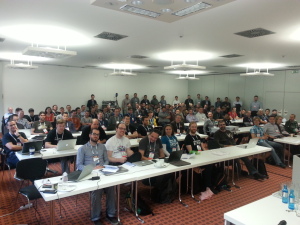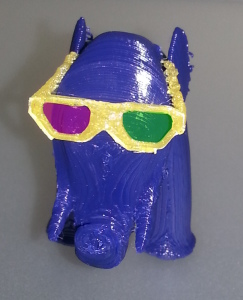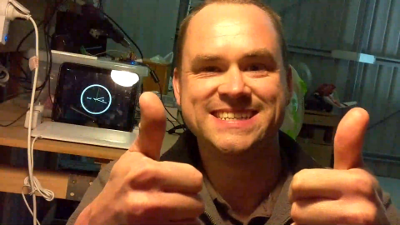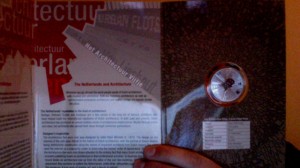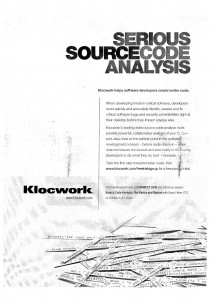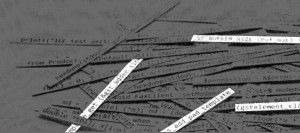We’re back at home after an awesome time in Istanbul, in which we attended GUADEC, did some sight-seeing (not enough), hung out with a bunch of really fun awesome people, and attended a great conference about what people are hacking on and planning for GNOME.
Friday
Arrived from Dublin around 11pm and got to the Golden Horn Sirkeci. Rang Wim & Christian and set one tone for the week by going out for beers until 3am.
Saturday
Woke up late. Hungover for some reason. Went out and explored the spice market and Grand Bazaar. On the way back to the hotel ran into Collabora people sitting on the terrace of their hotel.
 After a beer there, we all went searching for dinner and discovered the cushions on the street next to the Golden Horn, conveniently already populated with several other attendees, including Luis, Krissa and Phillip Van Hoof. Enjoyed dinner, beer & nargileh until after midnight.
After a beer there, we all went searching for dinner and discovered the cushions on the street next to the Golden Horn, conveniently already populated with several other attendees, including Luis, Krissa and Phillip Van Hoof. Enjoyed dinner, beer & nargileh until after midnight.
Sunday
Up early. Had breakfast at the hotel, and then off to the impromptu GStreamer summit from last blog post. Jaime went exploring while we chatted. We were short by a few key GStreamer hackers who either couldn’t make it to Istanbul or missed my poor excuse for an announcement, but had a nice solid representation of core hackers nevertheless. Quick summary:
- Discussed that we should move GStreamer out of CVS, and our best overall choice is Git. FDO already has the infrastructure, we have people who know how to use it and will be there to help those of us who don’t and, most importantly, Tim & Edward are willing to do the migration work.
- People weren’t interested in doing a 0.12 branch along the lines of 0.8->0.10 where everyone stops hacking on 0.10 for 12 months while the new version is produced. Instead, we should try a process where (after we move to Git and can do this sort of thing easily) people create their own experimental branches. After, when we have enough interesting experimental branches we try and bring them together and call it 0.12.
- Saw and did interesting demos of in progress hacking: Edward’s HDV camera support. Wim’s basetransform rework. My DVD navigation pieces.
After, went hunting food and stopped at a place where, as soon as they saw us looking at the menu, about 10 nice policemen jumped up from the tables they were sitting at and took their food inside so we could sit outside.
After lunch, Andy declared “Let’s go to Asia!”, and we caught a ferry. Saw police in riot gear and tanks, then discovered the protest they appeared to be prepared for. Had beer, caught another ferry and reclined in the Cushion Street again for more food, beer and nargileh.
Monday
 Up early and off to see Topkapi palace. I found myself constantly assessing features of the palace for ledges, handholds and other climbing points. Clearly played too much PoP.
Up early and off to see Topkapi palace. I found myself constantly assessing features of the palace for ledges, handholds and other climbing points. Clearly played too much PoP.
After, caught the tram to the conference venue. We had a little trouble finding the place, but not as much as some. Met up with some more people, and went to Ghee’s printing BOF and Marina’s Online Desktop widget talk. Went for dinner at 360 restaurant before joining the opening drinks at Reddim night club. Didn’t stay long after the price of beer changed and the temperature went up.
Tuesday

Had Turkish icecream for breakfast, then I went to the conference while Jaime did some more sightseeing. Enjoyed the Banshee BOF – Banshee is cool. Inspired to try using Banshee as my primary media player for a while.
Ran into Marc-Andre and Meriam on the way to dinner and they joined Wingo, Zeeshan and us for dinner and chilling followed by more chilling under the Galata bridge with others.
Wednesday
Straight to university in the morning. Went to the conference opening, then Travis’ Soylent talk, the Clutter Guts talk, lunch with Lennart and kfish. As always after a clutter talk, felt inspired to try building a video app in clutter.
After lunch, Leisa’s great keynote on user experience design. Inspired to reimplement Silverback by gluing Istanbul and Cheese together.
Florian’s Elisa talk was interesting, and we talked with him about why Elisa doesn’t work for our video-watching workflow. It still feels like Clutter and Pigment duplicate a lot of effort, but I understand why combining is tricky.
Pippin’s GEGL talk was great. I really liked his ‘semantic desktop prototype’ presentation tool. Inspired to hack pretty things with GEGL.
A second good keynote from Blizzard. I want to see more of his presentations. Interesting stuff about using Firefox to influence the future of the web. Intrigued by their optimisation tools and techniques. Inspired to go optimise something. Drinks on the roof of the university with live music, followed by Cushion Bar.
Thursday
Matt Webb’s keynote, then Rob’s Telepathy talk. I want to see features like ‘Right-click->share my desktop to Joe’ land in releases. Actually, I want to see ‘Right-click->Frag Joe in Quake ]|[‘ first.
Michael’s Moonlight canvas talk. There are lots of people exploring paths for the ‘platform for next generation UIs’ thing – clutter, moonlight, webkit, mozilla. It’ll be interesting to see where they converge.
After lunch, Kristian’s “GTK+ State of the Union’ keynote. I like their approach to GTK+ 3.0. The care it takes to preserve ABI/API while still producing new features and working around design shortcomings slows GStreamer development down too.
Went to Colin’s and then Owen’s Online Desktop talks. Glad to hear later that the APOC guys and the Online Desktop guys had some conversations about the commonalities and differences between them.
 Not sure why Alp’s WebKit talk qualified as a keynote, but maybe because I already saw substantially the same talk at FOSDEM.
Not sure why Alp’s WebKit talk qualified as a keynote, but maybe because I already saw substantially the same talk at FOSDEM.
Fun with penis-enlargement pumps at dinner. More fun at the Collabora boat party. I came 3rd in the icecream eating competition. Inspired to eat icecream, forever.
After the boat party, we went out for kebabs with a crowd led by Pete and Miguel. Amusing chilli eating competition between Aaron and Jono. A good time was had by all.
Friday
Went to Benjamin’s Flash talk, then Bastien’s update on bluetooth development. Interested in PackageKit, but worried that it has a restrictive (prescriptive?) view of what package management systems should be allowed to ask as they install things. Apparently I’m not the first.
Excellent set of lightning talks after lunch, then the AGM. I liked the inspirational tone of Federico’s Document-Centric-Gnome proposal, but found the paper design unconvincing. I’d like to see a prototype though 🙂
Google sponsored cup-o-beer-foam party had a good light show, but I can’t find a good pic of it.
Saturday
 Had a sleep-in and then visited the Blue Mosque and Aya Sofia before going to Alberto and Joerg’s APOC talk. Also went to Alberto’s talk about polishing GTK’s image. Somewhat inspired to create a ‘GNOME stack SDK’ for Windows that’d come with GStreamer, GTK, Pango, etc in one big bundle.
Had a sleep-in and then visited the Blue Mosque and Aya Sofia before going to Alberto and Joerg’s APOC talk. Also went to Alberto’s talk about polishing GTK’s image. Somewhat inspired to create a ‘GNOME stack SDK’ for Windows that’d come with GStreamer, GTK, Pango, etc in one big bundle.
After, went to the Galata tower, and then met up with Collabora guys and more to go to Asia again for dinner. Amusingly, the good restaurant from the guide book turned out to be the place we’d randomly ended up in on Sunday for drinks. Turns out the food is quite good.
Sunday
Caught the plane back to Dublin. Did some good hacking on the way – integrating my recent GStreamer DVD navigation work into playbin so (e.g.) Totem can use it. Check it out:
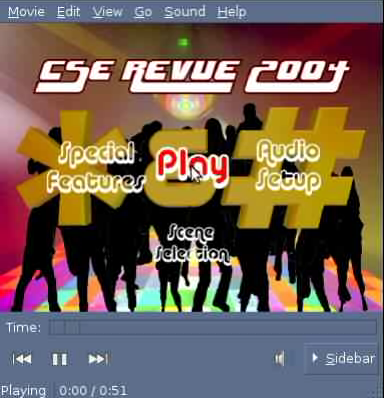
Hoping to have it feature complete within the next 2.5 months.
